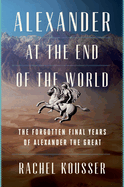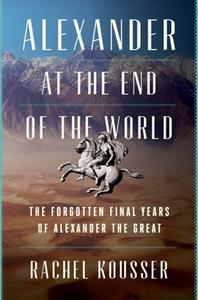
 Classicist Rachel Kousser (The Afterlives of Greek Sculpture) explores the definition of greatness and the power of evolving through failure in Alexander at the End of the World: The Forgotten Final Years of Alexander the Great. This action-heavy, suspenseful biography focuses not on Alexander's early series of wildly successful military victories but rather his turbulent later years, as the young king pushed himself, his army, and his entire empire to the breaking point.
Classicist Rachel Kousser (The Afterlives of Greek Sculpture) explores the definition of greatness and the power of evolving through failure in Alexander at the End of the World: The Forgotten Final Years of Alexander the Great. This action-heavy, suspenseful biography focuses not on Alexander's early series of wildly successful military victories but rather his turbulent later years, as the young king pushed himself, his army, and his entire empire to the breaking point.
In the summer of 330 BCE, Alexander attained victory over the Persian Empire. He could have returned to his homeland of Macedonia in triumph, or ruled his empire from Persepolis. Instead, "[h]e wanted to reach the literal ends of the earth, to see the Ocean that he believed encircled them." His men were ready to return home after four years away at war, but Alexander chose to continue east. He and his forces moved farther into the Middle East toward India, learning along the way that strategic brilliance would not always guarantee an easy victory. Alexander faced near-mutiny, guerrilla fighters, grievous physical injuries, and punishing weather conditions without losing his thirst for conquest. His life reads like a summer blockbuster, complete with epic battles against cunning foes, death-defying escapes, and opulent celebrations. Death and failure stalked him amid the grandeur; his hubris led him to put his forces in harm's way, with disastrous consequences, and his impulsiveness led him to murder. Alexander's many victories left him with a large fledgling empire to rule, one that now included non-Hellenic cultures. The military genius "had to compromise, to integrate... so that in the empire he had created, the conquered had a stake as well as the conquerors."
Kousser posits that Alexander's brand of imperialism had a different flavor than that of later European empires. He promoted his defeated enemies' subordinates to positions of power within his own bureaucracy and left a legacy that saw integration among the Greeks and the conquered. At the same time, she does not shrink from describing his flaws, mistakes, and brutality. She gives depth to Alexander's army and the lives of the women around him as much as source documents will allow. Her careful deconstruction of his successes and failures at governing backs up her assertion that Alexander's final years are well worthy of notice. Her alchemy of cultural context, political machinations, and heart-stopping fight scenes makes them engrossingly entertaining into the bargain. --Jaclyn Fulwood, blogger at Infinite Reads
Shelf Talker: This action-rich, thought-provoking biography explores Alexander the Great's ignored final years, his triumphs and failures, and their lessons.

